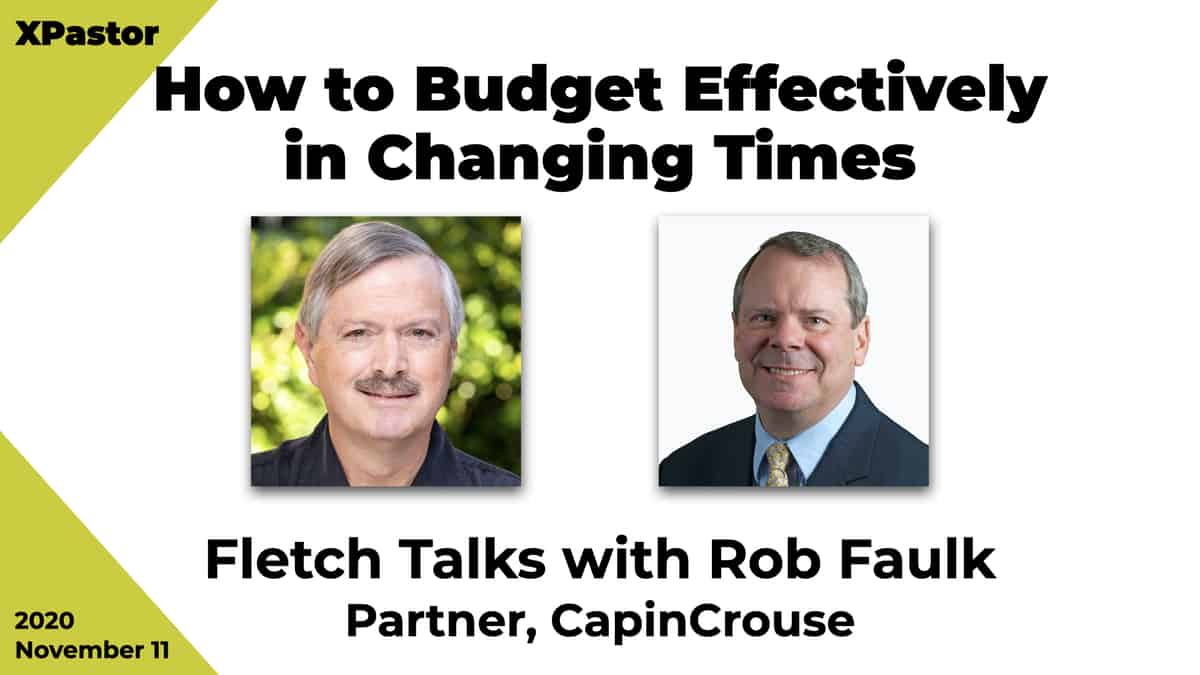Saturday, April 14, 2018
Hey Fletch … Our church is barely keeping the payroll and bills paid and we enter the budget process in June. Our elders keep casting a vision that requires 10% or more of deficit budgeting. Historical data says we will not receive from donors the needed amount. They say we should budget by “faith.” As a member of the finance team, I have a problem with continually asking the members to approve a deficit budget. We also have -0- reserves. Can you share some biblical principles that I can share with the finance team and leaders to show it is not a “lack of faith” to present a balanced budget? If giving doesn’t increase, we are either going to have to cut a position or sell a parsonage.
DRF—I’m a fan of balanced budgets. A budget that has a built-in deficit is a disaster waiting to happen. Jesus says in Luke 14:28-30, “For which of you, wanting to build a tower, doesn’t sit down first and compute the cost to see if he has enough money to complete it? Otherwise, when he has laid a foundation and is not able to finish the tower, all who see it will begin to make fun of him. They will say, ‘This man began to build and was not able to finish!’” Net Bible® Your church budget should adequately cover your existing obligations.
You can add to your church budget a special contingency budget. This can be a faith based approach. You inform the congregation that with current giving, the church budget is balanced. Then lay out the contingency budget, “if we receive $50,000 more in the next six months, then we will do these projects.” It is not a good idea to put salaries in the contingency budget, but do include special projects or renovations. If the extra funds don’t come in, then those projects won’t happen.
As for cash reserves, my friends Dan Busby & Michael Martin at the Evangelical Council for Financial Accountability say on this page: “Cash reserves are the cushion that ensures: Operating expenses are paid on-time instead of incurring late fees; The church is in compliance with mortgage covenants; Funds are available to replace worn-out HVAC; The church has the necessary funds ready to launch a new ministry.” You can download the ECFA free e-book, “Essentials of Church Cash Reserves.” Let me ask Dan Busby for his thoughts:
Response from Dan Busby, President of ECFA:
Thanks for the opportunity to provide input in relation to this request. What you have written in response to the email is RIGHT ON! Here are a few more thoughts:
-
- 10% of more in annual deficit budgeting with zero reserves is TOTALLY incompatible. If a church has excess reserves—say beyond six months of operating reserves, then perhaps a deficit budget might be appropriate to use some of the excess reserves but without proper reserves (let’s say at least three months of operating reserves, deficit budgeting indicates a lack of adequate responsibility by the governing board.
- This church is on the verge of failing John Wesley’s test. He said, “Our responsibility is to give the world the right impression of God.” A church that is barely keeping payroll and bills paid, is flirting with sending a very bad message to people inside and outside the church, as well as taking Jesus Christ off center stage and placing financial mismanagement on center stage.
- Restoring sanity to the financial planning for this church will require a conservative estimate of the next year’s revenue. When the governing board chooses, what I call, the “Big Number” for the next year’s budget, that number should probably be less than last year’s revenues. Otherwise, it is unlikely the church can build reserves. It goes without saying (except for this church) that reserves are only built when cash in exceeds cash out.
- If you need more scripture references, here are a few: “The wise store up choice food and olive oil, but fools gulp theirs down.” Proverbs 21:20.“Go to the ant, you sluggard; consider the ways and be wise? It has no commander, no overseer or rules, yet it stores its provisions in summer and gathers its food at harvest.” Proverbs 6:6-8.
Response—We had a church meeting the other evening regarding the finances and paying off a $3,900 credit card balance (which should have never happened). As a member of the finance team, I cut to the chase and informed those present that there must be a new attitude toward spending or else we were looking at cutting staff or selling the parsonage. I think people left better informed about the serious situation we are in. I’m going to propose to the finance team next week that we impose a spending freeze for items other than salaries and normal operating expenses for 3 months and see if we can get $1,500-$2,000 in the checking account. I’m working on forecasting now for finishing out the year and budgeting for next. Keep our church in your prayers and the finance team as we consider planning and honoring God with our decisions.







